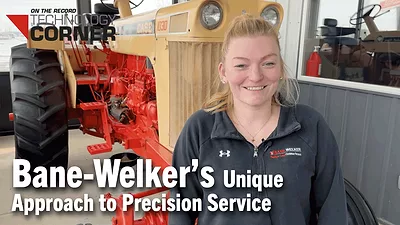A progressive approach to recruiting and training precision farming specialists can help dealers land talent in a competitive market.
It’s no secret that an ongoing challenge for precision farming dealers is finding new hires fully equipped with the skills to sell and service farm technology.
Historically, some dealers have transitioned a salesperson or mechanic into the role of precision farming specialist. This strategy can pay off for dealers, if they made the move during precision farming’s infancy, says Jason Fischer, agriculture instructor at Fox Valley Technical College in Appleton, Wis.
But with the rapid evolution of technology, it’s much harder for dealerships today to get technicians up to speed. In Wisconsin, if a dealership started 15 years ago with precision farming and grew with it over time, it’s easier to adapt to changes today, Fischer says.
“But now, we’re moving at 100 miles per hour. So when you start someone at zero and they have to get to 100 in a short period of time, it’s difficult and frustrating,” he says. “What we’re hearing from dealers is they understand the boom is coming. They’re trying to ramp up now and bring in people in dual roles so that they are ready in 3-5 years when this industry really takes off.”
Jason Fischer, agricultural instructor at Fox Valley Technical College in Appleton, Wis., talks about how universities can groom the next generation of precision farming specialist and what dealers should look for in new hires to ensure they end up with a qualified precision employees.
Fox Valley is among the technical schools and community colleges in the country that are expanding their precision farming programs in an effort to better prepare the next generation of specialists. Generating interest and guiding students toward careers in precision farming at an early age is going to be a key to preparing graduates for careers with dealerships, Fischer says.
“If you go up to a high school student today and say, ‘How would you like to work with the newest, greatest, latest technology dealing with satellites and computers,’ most would say ‘Absolutely,’” Fischer told Precision Farming Dealer at the recent Raven Innovation Summit in Sioux Falls, S.D.
But he admits that there’s no guarantee graduates will gravitate toward jobs as precision farming technicians. Competition among companies seeking tech-savvy employees is fierce, especially in the agriculture industry.
One precision ag manager with a dealership in Minnesota says they work with a local college to recruit new employees, but they’ve lost out on several recent graduates who took more lucrative jobs with other precision companies and manufacturers.
2013 Precision Education Directory
This directory is a resource for dealers to connect with local educational institutions in their area and forge training and employment partnerships. To add a program to the listing, contact Jack Zemlicka at jzemlicka@lesspub.com.
“We don’t necessarily get those guys right away. They tend to go into big companies and start out at $50,000 per year,” he says. “Precision specialists with us start at maybe $35,000 and that’s the high end, because we like to see them with a few years of experience.”
Colleges and universities are incorporating more diverse curriculum aimed at precision farming technology to include hands-on training with the latest equipment. Fox Valley partners with two manufacturers to borrow farm equipment with the latest technology each year.
But even the technology students work on today could be obsolete in two years, Fischer says, making it difficult to graduate precision farming specialists who can fully hit the ground running at dealerships.
“As an educational facility, we do the best we can to train students in every area we can. When they leave, the employer still has additional training to give for individual product lines,” he says. “That may take a year or two. We always want to make sure we’re ahead of that curve by 2-3 years, so those people are ready when the boom comes.”






